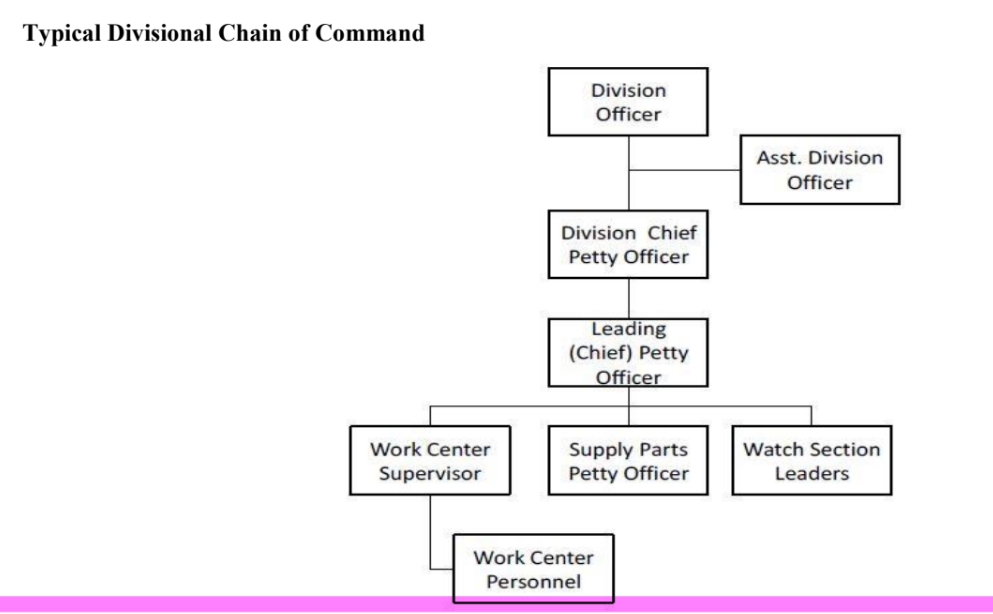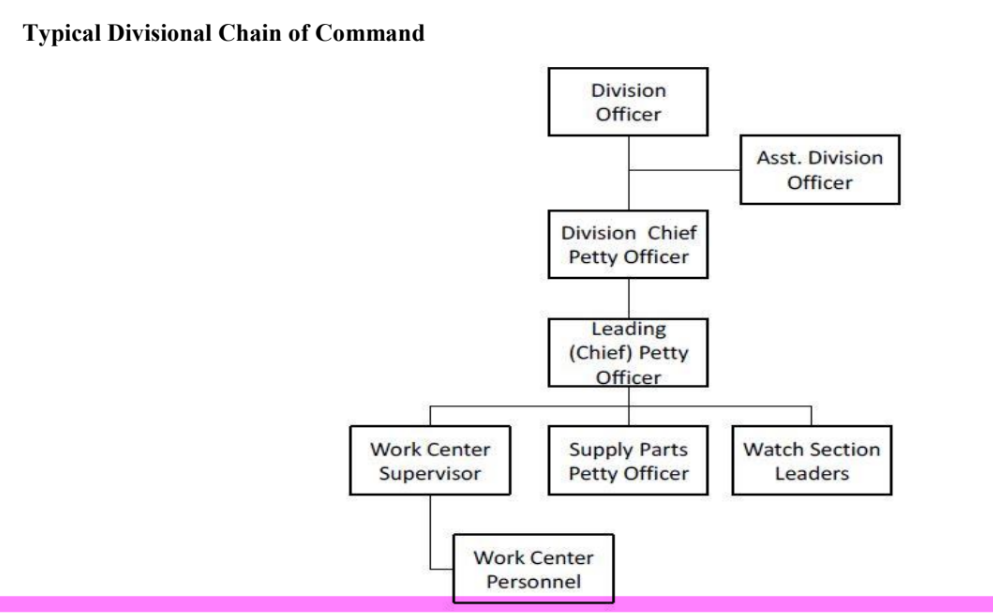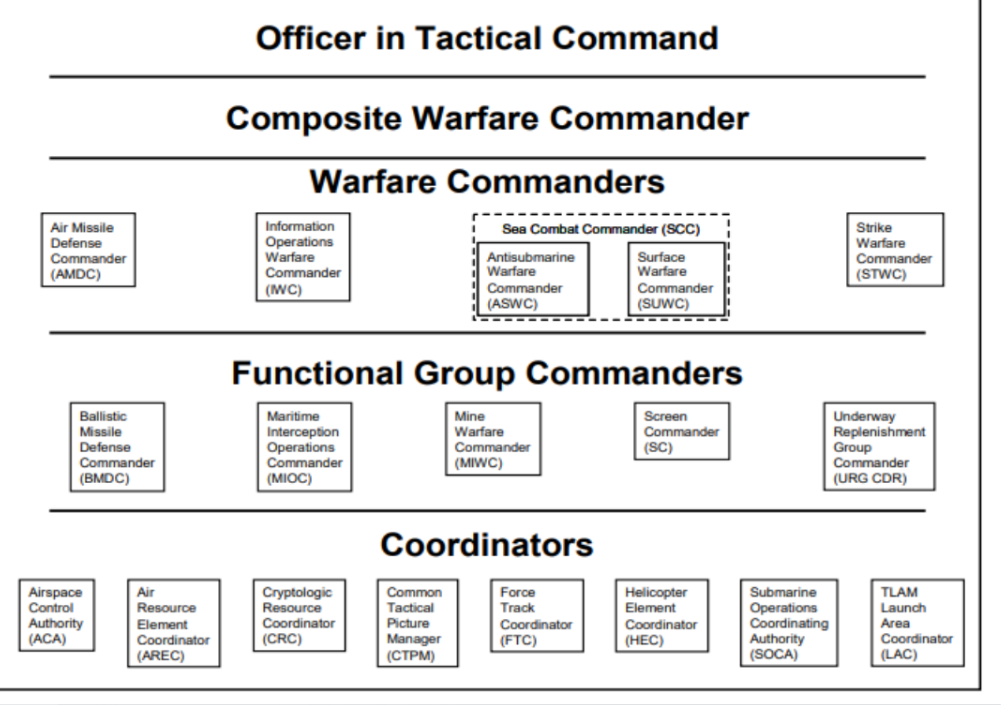Fall PCA
1/34
There's no tags or description
Looks like no tags are added yet.
Name | Mastery | Learn | Test | Matching | Spaced | Call with Kai |
|---|
No analytics yet
Send a link to your students to track their progress
35 Terms
Typical divisional shipboard CoC

Organization of supply department:
S1 - stock control
S2 - food services
S3 - retail
S4 - disbursing
CS
culinary specialist: food service catering, responsible for all aspects of dining, “heart of the ship”
LS
Logistic Specialist - customer service, operating financial systems, managing parts
RS
Retail Specialists - managing and operating shipboard retail and service activities
Radio Frequency Communications
3-300 Khz, can transmit high - very high - ultra high frequency communications. Can experience intentional and unintentional disturbances (comms jamming, imitative comms deception
Satellite Comms
utilize satellites in space or non-terrestrial transmitters to send information from one user to another. Increased access, redundancy, reduced latency and the versatility vs terrestrial networks.

Terrestrial networks
networks utilize terrestrial transmitters, or transmitters within the Earth’s atmosphere in order to send information (cell towers
Joint Intelligence Preparation of the Operating Environment
(1) Define the operational environment (OE).
(2) Describe the impact of the OE.
(3) Evaluate the adversary and other relevant actors.
(4) Determine the course of action (COA) for adversary and other relevant actors, particularly the most likely COA and the COA most dangerous to friendly forces and mission accomplishment.
Cyberspace Operations
Offensive Cyberspace Ops
Defensive Cyberspace Ops
DOD Information Network
3 Levels of Intelligence
Operational
Strategic
Tactical
US Army Mission
To deploy, fight and win our nation’s wars by providing ready, prompt and sustained land dominance by Army forces across the full spectrum of conflict as part of the joint force.
US Air Force Mission
The Department of the Air Force and the U.S. Air Force were established in 1947 by the National Security Act, which severed the Air Force from the Army. The Air Force includes air combat, missile, and service forces. It is organized, trained, and equipped for prompt and sustained offensive and defensive combat operations in the air. The mission of the United States Air Force is to fly, fight and win - airpower anytime, anywhere.
US Coast Guard Mission
The United States Coast Guard ensures our Nation's maritime safety, security and stewardship through Maritime Law Enforcement, Maritime Response, Maritime Prevention, Marine Transportation System Management, Maritime Security Operations, and Defense Operations.
Strategic
guidance that addresses strategic objectives in support of strategic end states and develops and uses national resources to achieve them.
Tactical
Tactics is the employment and ordered arrangement of forces in relation to each other.
Operational
The operational level links strategy and tactics by establishing operational objectives needed to achieve the military end states and strategic objectives.
Navy Planning Process
1) Mission Analysis
2) COA Development
3) COA Analysis (wargaming)
4) COA Comparison and Decision
5) Plan or Order Development
6) Transition
Composite Warfare Command Organization

Aegis
Cruisers and Destroyers
SSDS
amphibious and aircraft carriers, not offensive
OOD
designated by the commanding officer to be in charge of the ship including its safe and proper operation. TAO reports to OOD
EOOW
The EOOW is the officer or petty officer on watch designated by the engineer officer to be in charge of an engineering department watch section. They are responsible for safe and proper performance of engineering department watches following the orders of the engineer officer, the commanding officer and higher authority.
ISR
Observe and record video of other countries’ military exercises (etc.), relying on our stealth capabilities. Intercept communications to provide cueing to our forces. (SSN/SSGN)
NSW
DDS capabilities to insert SEALs near another country’s shore, allowing them easy access to and extraction from enemy territory with maximum stealth. (SSGN)
Strike
Launch Tomahawk cruise missiles into enemy territory with no warning, while operating submerged and undetected. (SSN/SSGN)
Anti sub/surface warfare
Track other countries’ submarines to get info regarding their operating patterns and acoustic information that we could use if we ever wentto war.
Track other countries’ surface ships to get info about their operating patterns and discover vulnerabilities to counter-detect these platforms. (SSN/SSGN)
Mine Warfare
Able to detect, avoid, and neutralize enemy mines, allowing us to counter-act Anti-Access/Area-Denial capabilities. Against countries who may try to close off choke points critical to maritime commerce or their own security. (SSN/SSGN)
Counter drug ops
Detect drug-running boats and submarines, then inform law enforcement. (SSN/SSGN)
Strategic Deterrence
Remain undetected as a capable delivery vehicle of nuclear warheads to hostile nations.SSBNs make up the survivable leg of the nuclear triad (bombers, missile silos, submarines) as they operateundetected in the world’s oceans. Nuclear deterrence theory suggests that the only defense against a nuclear attack from a nation-state is a retaliatory nuclear strike resulting in mutual destruction. (SSBN)
SSN Deployment
typically operate on 6 month deployments,
SSGN Deployment
15 month deployments. Like SSBNs, SSGNs will have two crews which are able to swap out in theater to allow for proper crew training, readiness and morale.
SSBNs
Onaverage, the submarines spend 77 days at sea followed by 35 days in-port for maintenance. two crews, Blue and Gold, which alternate manning the submarines and taking them on patrol.
Squadron lifecycle
36 months
Carrier Air Wing
F/A-18E/F Hornets and Super Hornets
o EA-18G Growlers
o F-35C Lightning II
o E-2D Hawkeyes
o C-2A Greyhounds
o MH-60R “Romeo” Seahawks
o MH-60S “Sierra” Knighthawk